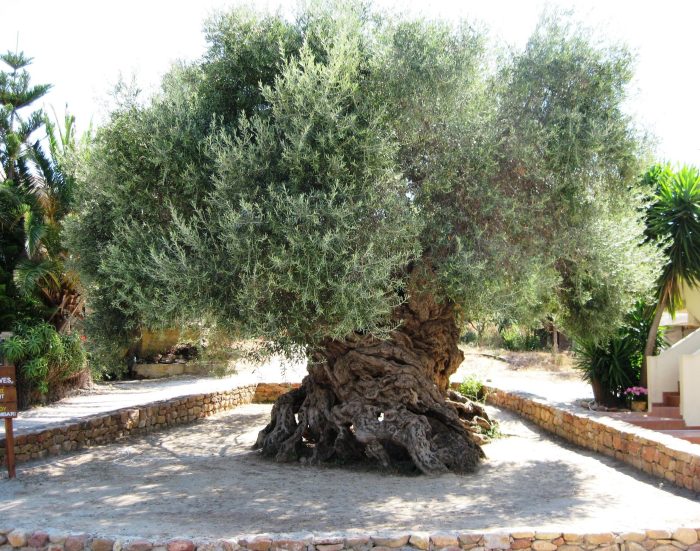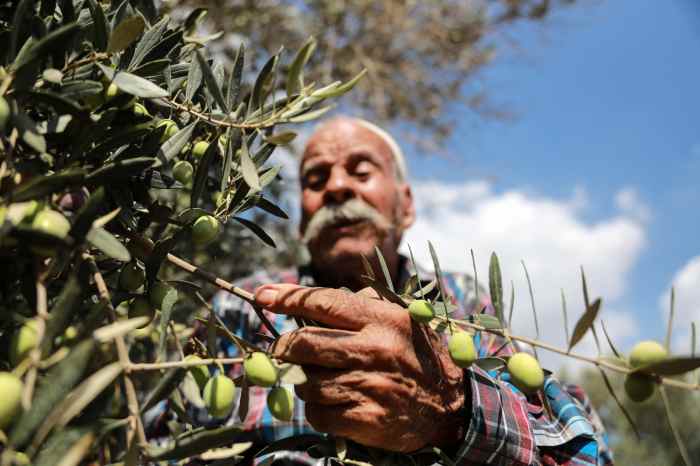Environmental Impact and Sustainability: Plant An Olive Tree In Palestine

Plant an olive tree in palestine – Olive tree cultivation in Palestine, deeply interwoven with the cultural and historical fabric of the region, also presents significant environmental implications. The impact of these practices, both positive and negative, is shaped by factors ranging from traditional farming methods to the increasing pressures of climate change and population growth. Understanding these multifaceted effects is crucial for ensuring the long-term sustainability of olive production in Palestine.The cultivation of olive trees offers several environmental benefits.
Olive groves provide habitat for various plant and animal species, contributing to biodiversity. The trees themselves help prevent soil erosion through their extensive root systems, which stabilize the land. Furthermore, olive trees require relatively little water compared to other crops, making them a relatively water-efficient choice in a region often facing water scarcity. The olive oil production process, particularly when employing traditional methods, generally has a lower environmental impact than many other agricultural industries.
Environmental Challenges and Proposed Solutions
Several environmental challenges threaten the sustainability of olive farming in Palestine. Water scarcity, exacerbated by climate change, is a major concern. Soil degradation, resulting from unsustainable farming practices, poses another significant threat. The use of chemical fertilizers and pesticides can pollute water sources and harm biodiversity. Overgrazing in some areas further contributes to land degradation.
Solutions include implementing water-efficient irrigation techniques, such as drip irrigation, promoting sustainable soil management practices, such as agroforestry and crop rotation, and encouraging the adoption of integrated pest management strategies that minimize the use of synthetic pesticides. Governmental support for sustainable agricultural practices and investment in research and development are also essential.
Carbon Footprint Comparison of Traditional and Modern Olive Farming Methods
Traditional olive farming methods in Palestine, often characterized by smaller farms, low inputs of synthetic fertilizers and pesticides, and reliance on animal labor, generally have a lower carbon footprint compared to modern, intensive farming methods. Modern methods, while potentially increasing yield, often involve higher energy consumption from machinery, increased use of chemical inputs with associated transportation emissions, and a higher reliance on fossil fuels.
For example, a study comparing a small, traditional olive farm in the West Bank to a larger, more mechanized farm in the same region might reveal a significant difference in greenhouse gas emissions, with the traditional farm showing a considerably smaller carbon footprint. Quantifying this difference precisely requires detailed life-cycle assessments, taking into account all aspects of production, from land preparation to processing and transportation.
Sustainable Practices for Olive Tree Farming in Palestine
Sustainable olive farming in Palestine requires a multifaceted approach. The following practices are crucial for minimizing environmental impact and ensuring the long-term viability of the industry:
- Adopting water-efficient irrigation techniques (e.g., drip irrigation).
- Implementing integrated pest management strategies to reduce reliance on synthetic pesticides.
- Utilizing organic fertilizers and compost to improve soil health and reduce reliance on synthetic fertilizers.
- Promoting agroforestry systems to enhance biodiversity and soil stability.
- Employing sustainable harvesting techniques that minimize soil erosion.
- Improving post-harvest processing methods to reduce waste and energy consumption.
- Investing in renewable energy sources to power olive oil mills.
- Educating farmers about sustainable practices and providing access to relevant technologies and resources.
Socio-economic Aspects of Olive Tree Cultivation
Olive tree farming plays a significant role in the Palestinian economy, contributing substantially to both income generation and employment, particularly in rural areas. The cultivation, processing, and marketing of olives and olive oil represent a vital sector, deeply intertwined with Palestinian cultural heritage and identity.
Olive tree cultivation significantly impacts rural Palestinian communities. It provides a primary source of livelihood for many families, offering income from the sale of olives, olive oil, and other olive-derived products. Furthermore, it fosters a sense of community through shared agricultural practices and traditional knowledge transmission across generations. The industry also supports related sectors such as transportation, packaging, and marketing, further expanding its economic influence.
Right, so planting an olive tree in Palestine, a pretty symbolic gesture, innit? Thinking about spacing, it’s a bit like considering how far apart to plant dogwood trees , you need to give them room to grow, obviously. The same principle applies to those olive trees – proper spacing ensures a thriving grove, a proper testament to resilience and hope.
The Role of Olive Tree Farming in the Palestinian Economy
Olive tree farming is a cornerstone of the Palestinian agricultural sector, contributing significantly to national GDP. The industry provides employment opportunities across various stages of production, from cultivation and harvesting to processing, packaging, and marketing. The income generated supports numerous families, contributing to economic stability and reducing reliance on external aid. The export of Palestinian olive oil also plays a role in generating foreign currency.
Impact of Olive Tree Cultivation on Rural Communities
Olive tree cultivation is deeply embedded in the social fabric of rural Palestinian communities. It provides a vital source of income, food security, and employment, thus mitigating poverty and contributing to social cohesion. The shared agricultural practices, collective harvesting, and traditional knowledge associated with olive cultivation strengthen community bonds and cultural identity. However, the economic viability of olive farming is significantly influenced by external factors such as market access and political instability.
Challenges Faced by Palestinian Olive Farmers
Palestinian olive farmers face numerous challenges that hinder the full potential of the sector. Access to land is a major constraint, with ongoing land disputes and restrictions on access to agricultural areas impacting productivity. Furthermore, limited market access, including restrictions on exports and competition from larger producers, negatively affects the profitability of olive farming. The lack of adequate infrastructure, including irrigation systems and processing facilities, also presents a significant challenge.
Finally, the ongoing political instability and security concerns often disrupt farming activities and access to markets.
Economic Benefits of Olive Oil Production in Palestine
| Stage of Production | Cost (USD) | Revenue (USD) | Profit Margin (%) |
|---|---|---|---|
| Cultivation (per hectare) | 500-1000 | 1500-3000 (depending on yield and price) | 33-66% |
| Harvesting (per hectare) | 200-400 | (Included in overall revenue) | (Included in overall profit margin) |
| Processing (per liter) | 1-2 | (Included in overall revenue) | (Included in overall profit margin) |
| Marketing & Distribution (per liter) | 0.5-1.5 | (Included in overall revenue) | (Included in overall profit margin) |
Note: These figures are estimates and can vary significantly depending on factors such as land quality, yield, olive oil price, and market conditions. Precise data on the cost and revenue for each stage of production are often difficult to obtain due to the informal nature of some aspects of the industry. However, these figures represent a reasonable approximation based on available information and expert estimates from various reports on Palestinian agriculture.
Political and Legal Considerations

The cultivation of olive trees in Palestine is deeply intertwined with complex political and legal realities, significantly impacting the livelihoods of Palestinian farmers and the preservation of cultural heritage. The legal framework governing land ownership and agricultural practices is contested and often influenced by ongoing political conflicts. This section examines the legal complexities, the effects of political instability, the role of international support, and successful initiatives aimed at safeguarding Palestinian olive groves.The legal framework governing olive tree cultivation and land ownership in Palestine is multifaceted and contested.
Ownership rights are often disputed due to historical land confiscations and the ongoing Israeli occupation of Palestinian territories. Israeli laws and regulations frequently affect Palestinian farmers’ access to their land and resources, including olive groves. Palestinian authorities, meanwhile, strive to maintain control over agricultural practices and land use within the areas under their jurisdiction, but their ability to do so is often limited by the political situation.
This creates a complex legal landscape where the rights and responsibilities of Palestinian farmers are often unclear and subject to varying interpretations.
Legal Framework Governing Olive Tree Cultivation and Land Ownership, Plant an olive tree in palestine
The legal framework surrounding olive tree cultivation and land ownership in Palestine is a product of historical events and ongoing political realities. Palestinian law, where applicable, aims to protect farmers’ rights and regulate agricultural practices. However, the Israeli occupation significantly impacts this framework. Israeli military orders and civil administration regulations often restrict access to land, water resources, and necessary agricultural inputs for Palestinian farmers.
Disputes over land ownership frequently arise, complicated by the absence of a comprehensive, universally recognized land registry system encompassing all areas relevant to Palestinian olive farming. This legal ambiguity creates significant challenges for Palestinian farmers seeking to protect their livelihoods and maintain their olive groves.
Impact of Political Conflicts on Olive Tree Farming
Political conflicts have severely impacted olive tree farming in Palestine. The ongoing Israeli-Palestinian conflict directly affects olive harvests through various means. Land confiscations for settlement construction or military activities directly remove productive olive groves. The construction of the separation barrier disrupts access to land and water sources, affecting the productivity of existing groves. Violence and harassment by Israeli settlers and security forces against Palestinian farmers further hinder their ability to cultivate and harvest their olives.
These actions not only lead to economic losses but also cause psychological distress and disrupt traditional farming practices that have been integral to Palestinian culture for centuries.
Role of International Organizations in Supporting Palestinian Olive Farmers
Several international organizations play a crucial role in supporting Palestinian olive farmers. These organizations offer various forms of assistance, including providing technical expertise in sustainable agricultural practices, advocating for Palestinian farmers’ rights, and facilitating access to financial resources and markets. Organizations such as the United Nations Relief and Works Agency for Palestine Refugees in the Near East (UNRWA) and various NGOs actively work to empower Palestinian farmers and protect their olive groves.
Their efforts often involve providing training, supplying equipment, and advocating for policy changes that would enhance the livelihoods and legal security of Palestinian olive farmers. These initiatives aim to mitigate the negative impact of the political situation and strengthen the resilience of the Palestinian agricultural sector.
Examples of Successful Initiatives Promoting the Protection of Palestinian Olive Groves
Numerous initiatives have demonstrated success in promoting the protection of Palestinian olive groves. These initiatives often involve collaborative efforts between local communities, NGOs, and international organizations. One example is the establishment of community-based olive oil cooperatives, which empower farmers by providing access to markets and fair pricing. These cooperatives also facilitate shared resources and collective action in protecting their groves.
Another example is the use of Geographic Indication (GI) labeling to promote the unique quality and origin of Palestinian olive oil, enhancing its market value and supporting the economic viability of olive farming. Such initiatives not only contribute to the economic sustainability of Palestinian olive farming but also serve as a powerful symbol of cultural preservation and resilience in the face of political challenges.
Clarifying Questions
What types of soil are best for growing olive trees in Palestine?
Olive trees thrive in well-drained, slightly alkaline soils. Specific soil types vary regionally within Palestine.
What are the main pests and diseases affecting olive trees in Palestine?
Common threats include olive fruit fly, olive knot, and various fungal diseases. Disease resistance varies among olive tree varieties.
What are the legal requirements for owning and cultivating olive trees in Palestine?
Land ownership and olive cultivation are governed by complex legal frameworks, often impacted by political considerations. Specific regulations vary depending on the region and prevailing political circumstances.
Are there any organizations supporting Palestinian olive farmers?
Yes, several international and local organizations provide support, including assistance with agricultural techniques, market access, and legal advocacy.
